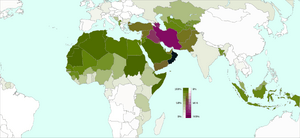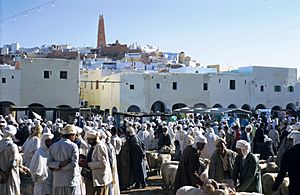Ibadi facts for kids
Al-Ibādhiyyah, also known as Ibadi Islam, is a branch of Islam. It is the main form of Islam in Oman. You can also find Ibadi communities in countries like Algeria and Libya.
Ibadi Islam is one of the oldest Islamic schools of thought. It started less than 50 years after the death of the prophet Muhammad. This branch grew from an early Islamic group called the Kharijites. However, many Ibadis today do not see themselves as Kharijites. Ibadi teachings allow people to interpret religious sayings (hadiths) using common sense.
The name "Ibadi" comes from Abdullah ibn-Ibadh. Some followers believe its true founder was Jabir ibn Zaid al-'Azdi from Nizwa, Oman.
Contents
How Ibadis are Different
Ibadi communities are generally seen as traditional. They do not practice qunūt, which are special prayers said while standing.
Traditionally, Sunni Muslims have seen Ibadis as a Kharijite group. However, modern Ibadis do not call other Muslims kuffar (unbelievers). Instead, they might call them kuffar an-niˤma, meaning "those who deny God's grace." This view has changed a lot over time.
Ibadis believe a true follower of Islam should show their attitude towards others in three ways:
- walāyah: This means showing friendship and unity with true believers and Ibadi Imams.
- barā'ah: This means avoiding dealings with unbelievers and sinners. It also means showing some distance towards them.
- wuqūf: This means being unsure about people whose religious status is not clear.
Unlike the early Kharijites, Ibadis no longer practice killing other Muslims.
Ibadi Views on Early Caliphs
Ibadis agree with Sunnis about the first two Caliphs, Abū Bakr and Umar ibn al-Khattab. They see them as rightly-guided leaders. However, they believe Uthman ibn Affan brought new, unwanted practices (bidˤa) into Islam. They supported the revolt that removed him from power.
They also approve of the first part of ˤAlī's time as Caliph. Like Shia Muslims, they do not approve of ˤĀ'isha's rebellion against Ali. They also disapprove of Muˤāwiyya's revolt. However, Ibadis believe Ali made a mistake by agreeing to talk things out at the Battle of Siffin. They felt this made him unfit to be an Imam. They also criticize Ali for killing early Kharijites at the Battle of Nahrawan.
Main Differences in Beliefs
Ibadis have several key differences in their beliefs compared to mainstream Islam:
- Seeing Allah: Ibadis believe Muslims will not see Allah on the Day of Judgment. This comes from the Qur'an, where Prophet Ibrahim is told, "You shall not see me." This is different from the mainstream Sunni belief that Muslims will see Allah. This Ibadi belief is similar to what Shia Muslims believe.
- Hellfire: Ibadis believe that anyone who enters Hellfire will stay there forever. Sunni Muslims, however, believe that some Muslims who enter Hellfire will stay for a set time to be purified, and then they will go to Paradise. Sunnis also believe unbelievers stay in Hell forever.
- The Qur'an: Ibadis believe the Qur'an was created. Most Sunni Muslims strongly believe the Qur'an is uncreated. Many Shia Muslims also believe the Qur'an was created.
- Hadiths: Ibadis do not consider the main Sunni hadith collections (like Kutub al-Sittah) or Shia hadiths as official. They rely more on individual interpretations.
Ibadis believe the fifth true Caliph was Abdullah ibn Wahb al-Rasibi. They see all Caliphs after Muˤāwiyya as rulers who were not just, except for Umar ibn Abdul Aziz, about whom opinions differ. However, later Ibadi leaders are recognized as true imāms. These include Abdullah ibn Yahya al-Kindi from South Arabia and the imams of the Rustamid dynasty in North Africa.
Where Ibadis Live Today
Ibadi Muslims are also found in Jabal Nafusa in Libya, Mzab in Algeria, East Africa (especially Zanzibar), and Djerba Island in Tunisia. The early medieval Rustamid dynasty in Algeria was Ibadi. People who fled its capital, Tahert, founded the Ibadi communities that exist in North Africa today.
Images for kids
-
The Ibadi Rustamid dynasty ruled the modern-day Algeria region for over a century.
See also
 In Spanish: Ibadíes para niños
In Spanish: Ibadíes para niños
 | Stephanie Wilson |
 | Charles Bolden |
 | Ronald McNair |
 | Frederick D. Gregory |




